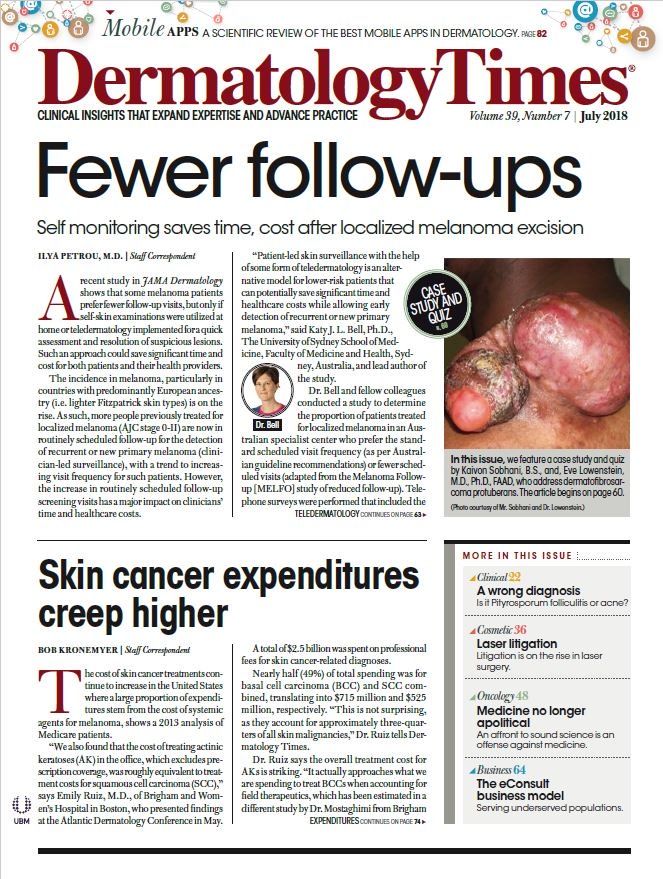- Acne
- Actinic Keratosis
- Aesthetics
- Alopecia
- Atopic Dermatitis
- Buy-and-Bill
- COVID-19
- Case-Based Roundtable
- Chronic Hand Eczema
- Chronic Spontaneous Urticaria
- Drug Watch
- Eczema
- General Dermatology
- Hidradenitis Suppurativa
- Melasma
- NP and PA
- Pediatric Dermatology
- Pigmentary Disorders
- Practice Management
- Precision Medicine and Biologics
- Prurigo Nodularis
- Psoriasis
- Psoriatic Arthritis
- Rare Disease
- Rosacea
- Skin Cancer
- Vitiligo
- Wound Care
Publication
Article
Dermatology Times
Immunotherapy still works post treatment in melanoma
Author(s):
Pembrolizumab has antitumor activity that is durable long after treatment is stopped in patients with advanced melanoma, researchers reported at the 2018 annual meeting of the American Society of Clinical Oncology (ASCO) on June 4.
Pembrolizumab has antitumor activity that is durable long after treatment is stopped in patients with advanced melanoma, researchers reported at the 2018 annual meeting of the American Society of Clinical Oncology (ASCO) on June 4.
This study, called the KEYNOTE-006 trial, showed that about 86% of patients remained progression-free 20 months after they had completed two years of treatment with anti-PD-1, an immunotherapy for patients with advanced melanoma, investigator Georgina V. Long, M.D., Ph.D., reported in her presentation.
Dr. Long, who is chair of Melanoma Medical Oncology and Translational Research at Melanoma Institute Australia and Royal North Shore Hospital of the University of Sydney, said that eight patients who progressed were treated with pembrolizumab. Half of those patients reported ongoing responses.
“Re-treatment with pembrolizumab upon progression can provide additional antitumor activity and acceptable safety,” she said.
These results suggest stopping anti-PD-1 therapy after two years is a reasonable approach to treatment of advanced melanoma, Douglas B. Johnson, M.D., said in a podium discussion of the study results.
“The progression-free survival after stopping therapy is quite good,” said Dr. Johnson, Director of the Melanoma Program at Vanderbilt Ingram Cancer Center, Nashville, Tenn.
However, more research is needed to determine whether retreatment with pembrolizumab is going to be a useful strategy for patients who progress after stopping an immune checkpoint inhibitor: “We really at this point have no idea whether anti-PD-1 rechallenge is effective in this population,” Dr. Johnson said.
UPDATED SURVIVAL
Dr. Long’s presentation also included recently updated survival results for both the pembrolizumab and ipilimumab arms of the KEYNOTE-006 trial.
The phase three KEYNOTE-006 trial included 834 patients with advanced melanoma randomized evenly to three arms: pembrolizumab every two weeks, pembrolizumab every three weeks, or ipilimumab, the anti-CTLA-4 antibody. Investigators enrolled both treatment-naïve patients and patients who had received one prior treatment, excluding anti-PD-1, anti-PD-L1, or anti-CTLA-4 agents.
With a median follow-up of 22.9 months, median overall survival had not been reached in either pembrolizumab arm, compared to 16.0 months for ipilimumab, shows results published in October 2017 in The Lancet.
Those results established the superiority of pembrolizumab over ipilimumab for treatment of advanced melanoma, Dr. Long said in her presentation at ASCO, in which she presented four-year outcomes.
With a median follow-up of 45.9 months, the updated data now show a median overall survival of 32.7 months, versus 15.9 months for ipilimumab. The 4-year overall survival was 41.7% and 34.1% for pembrolizumab and ipilimumab, respectively.
Specifically, in the treatment naïve subset of patients, overall survival was 38.7 versus 17.1 months for pembrolizumab and ipilimumab, respectively, with 4-year overall survival of 44.3% and 36.4%.
OUTCOMES AFTER TREATMENT ENDS
Pembrolizumab yielded durable treatment responses in patients who completed two years of planned treatment. Out of 556 patients who received pembrolizumab, 103 (18.5%) completed the full two years, and of those, 86% were progression-free at 20 months after the end of therapy.
Patients who had a complete response after those two years of treatment had an 18-month progression-free survival of 95.8%, compared with 91.3% for those who had partial response, and 66.7% for those with stable disease.
PEMBROLIZUMAB RECHALLENGE
In the KEYNOTE-006 study, patients who stopped pembrolizumab or completed the full two years of planned treatment could receive a second course of the immune checkpoint inhibitor, for up to a year of additional therapy.
A total of eight patients have had a second course of pembrolizumab, with recurrences after first course occurring mainly in lymph nodes and skin, according to Dr. Long. Of those eight patients, only one discontinued the second course due to disease progression, while three completed one full year of pembrolizumab, two are in ongoing treatment, and one discontinued due to a respiratory infection.
Adverse events for these patients were mild in both their first and second course of pembrolizumab, according to the investigator.
“Of the eight patients, four have ongoing responses after the second course pembrolizumab, three have stable disease, and only one patient had progressive disease as the best response,” Dr. Long said.
DISCLOSURES
Dr. Long reported honoraria from Bristol-Myers Squibb, Incyte, Merck, Novartis, and Roche, and a consulting or advisory role with Amgen, Array BioPharma, Bristol-Myers Squibb, Incyte, MERCK, Novartis, Pierre Fabre, and Roche/Genentech.
REFERENCES
Long GV, Schachter J, Ribas A, et al. “4-year survival and outcomes after cessation of pembrolizumab (pembro) after 2-years in patients (pts) with ipilimumab (ipi)-naive advanced melanoma in KEYNOTE-006.” American Society of Clinical Oncology 2018 Annual Meeting. Presented Monday, June 4, 2018. Abstract 9503.
Schachter J, Ribas A, Long GV, et al. “Pembrolizumab versus ipilimumab for advanced melanoma: final overall survival results of a multicentre, randomised, open-label phase 3 study (KEYNOTE-006).” Lancet. 2017 Oct 21;390(10105):1853-1862. doi: 10.1016/S0140-6736(17)31601-X.

Newsletter
Like what you’re reading? Subscribe to Dermatology Times for weekly updates on therapies, innovations, and real-world practice tips.





























